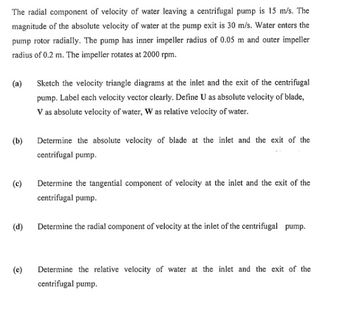
Elements Of Electromagnetics
7th Edition
ISBN: 9780190698614
Author: Sadiku, Matthew N. O.
Publisher: Oxford University Press
expand_more
expand_more
format_list_bulleted
Concept explainers
Question

Transcribed Image Text:The radial component of velocity of water leaving a centrifugal pump is 15 m/s. The
magnitude of the absolute velocity of water at the pump exit is 30 m/s. Water enters the
pump rotor radially. The pump has inner impeller radius of 0.05 m and outer impeller
radius of 0.2 m. The impeller rotates at 2000 rpm.
(a)
(b)
(c)
(d)
(e)
Sketch the velocity triangle diagrams at the inlet and the exit of the centrifugal
pump. Label each velocity vector clearly. Define U as absolute velocity of blade,
V as absolute velocity of water, W as relative velocity of water.
Determine the absolute velocity of blade at the inlet and the exit of the
centrifugal pump.
Determine the tangential component of velocity at the inlet and the exit of the
centrifugal pump.
Determine the radial component of velocity at the inlet of the centrifugal pump.
Determine the relative velocity of water at the inlet and the exit of the
centrifugal pump.
Expert Solution
This question has been solved!
Explore an expertly crafted, step-by-step solution for a thorough understanding of key concepts.
This is a popular solution
Trending nowThis is a popular solution!
Step by stepSolved in 4 steps with 1 images

Knowledge Booster
Learn more about
Need a deep-dive on the concept behind this application? Look no further. Learn more about this topic, mechanical-engineering and related others by exploring similar questions and additional content below.Similar questions
- The front and side views of a centrifugal impeller are shown in the figure below. All symbols have their usual meanings. The outer radius of the impeller is r2 = 0.4 m and the blade height at the impeller outlet b2₂ = 0.03 m. The volume flow rate of water (density = 1000 kg/m³) through the impeller is 0.2 m³/s. The outlet blade angle 8₂ = 50 degrees and the impeller rotational speed w=1600 rpm. Assume negligible losses, and the design conditions of whirl-free and shock-free entry. The impeller torque is B₂F N-m. Front View 12 b2 |+| Side Viewarrow_forwardPlease show all working outarrow_forwardThe front and side views of a centrifugal impeller are shown in the figure below. All symbols have their usual meanings. The outer radius of the impeller is r2 = 0.4 m and the blade height the impeller outlet b₂ = 0.02 m. The volume flow rate of water (density = 1000 kg/m³) through the impeller is 0.5 m³/s. The outlet blade angle 3₂ = 35 degrees and the impeller rotational speed w=1600 rpm. Assume negligible losses, and the design conditions of whirl-free and shock-free entry. The gravitational acceleration g = 9.81 m/s². The theoretical (Euler) head is m. Front View P₂1 r2 b2- 118 Side Viewarrow_forward
arrow_back_ios
arrow_forward_ios
Recommended textbooks for you
 Elements Of ElectromagneticsMechanical EngineeringISBN:9780190698614Author:Sadiku, Matthew N. O.Publisher:Oxford University Press
Elements Of ElectromagneticsMechanical EngineeringISBN:9780190698614Author:Sadiku, Matthew N. O.Publisher:Oxford University Press Mechanics of Materials (10th Edition)Mechanical EngineeringISBN:9780134319650Author:Russell C. HibbelerPublisher:PEARSON
Mechanics of Materials (10th Edition)Mechanical EngineeringISBN:9780134319650Author:Russell C. HibbelerPublisher:PEARSON Thermodynamics: An Engineering ApproachMechanical EngineeringISBN:9781259822674Author:Yunus A. Cengel Dr., Michael A. BolesPublisher:McGraw-Hill Education
Thermodynamics: An Engineering ApproachMechanical EngineeringISBN:9781259822674Author:Yunus A. Cengel Dr., Michael A. BolesPublisher:McGraw-Hill Education Control Systems EngineeringMechanical EngineeringISBN:9781118170519Author:Norman S. NisePublisher:WILEY
Control Systems EngineeringMechanical EngineeringISBN:9781118170519Author:Norman S. NisePublisher:WILEY Mechanics of Materials (MindTap Course List)Mechanical EngineeringISBN:9781337093347Author:Barry J. Goodno, James M. GerePublisher:Cengage Learning
Mechanics of Materials (MindTap Course List)Mechanical EngineeringISBN:9781337093347Author:Barry J. Goodno, James M. GerePublisher:Cengage Learning Engineering Mechanics: StaticsMechanical EngineeringISBN:9781118807330Author:James L. Meriam, L. G. Kraige, J. N. BoltonPublisher:WILEY
Engineering Mechanics: StaticsMechanical EngineeringISBN:9781118807330Author:James L. Meriam, L. G. Kraige, J. N. BoltonPublisher:WILEY

Elements Of Electromagnetics
Mechanical Engineering
ISBN:9780190698614
Author:Sadiku, Matthew N. O.
Publisher:Oxford University Press

Mechanics of Materials (10th Edition)
Mechanical Engineering
ISBN:9780134319650
Author:Russell C. Hibbeler
Publisher:PEARSON

Thermodynamics: An Engineering Approach
Mechanical Engineering
ISBN:9781259822674
Author:Yunus A. Cengel Dr., Michael A. Boles
Publisher:McGraw-Hill Education

Control Systems Engineering
Mechanical Engineering
ISBN:9781118170519
Author:Norman S. Nise
Publisher:WILEY

Mechanics of Materials (MindTap Course List)
Mechanical Engineering
ISBN:9781337093347
Author:Barry J. Goodno, James M. Gere
Publisher:Cengage Learning

Engineering Mechanics: Statics
Mechanical Engineering
ISBN:9781118807330
Author:James L. Meriam, L. G. Kraige, J. N. Bolton
Publisher:WILEY